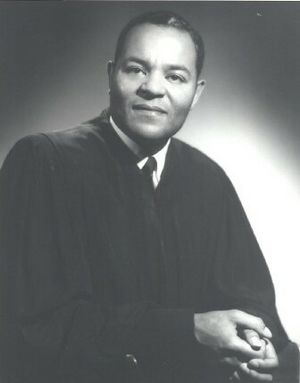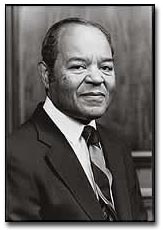Wade H. McCree facts for kids
Quick facts for kids
Wade H. McCree
|
|
|---|---|
 |
|
| 36th Solicitor General of the United States | |
| In office March 28, 1977 – January 20, 1981 |
|
| Appointed by | Jimmy Carter |
| Preceded by | Robert Bork |
| Succeeded by | Rex E. Lee |
| Judge of the United States Court of Appeals for the Sixth Circuit | |
| In office September 7, 1966 – March 28, 1977 |
|
| Appointed by | Lyndon B. Johnson |
| Preceded by | Seat established by 80 Stat. 75 |
| Succeeded by | Damon Keith |
| Judge of the United States District Court for the Eastern District of Michigan | |
| In office September 29, 1961 – September 13, 1966 |
|
| Appointed by | John F. Kennedy |
| Preceded by | Seat established by 75 Stat. 80 |
| Succeeded by | Lawrence Gubow |
| Personal details | |
| Born |
Wade Hampton McCree Jr.
July 3, 1920 Des Moines, Iowa |
| Died | August 30, 1987 (aged 67) Detroit, Michigan |
| Political party | Democratic |
| Education | Fisk University (AB) Harvard Law School (LLB) |
Wade Hampton McCree Jr. (born July 3, 1920 – died August 30, 1987) was an important American lawyer, judge, and public official. He also taught law at a university. He made history as the first African American to be appointed as a United States circuit judge for the United States Court of Appeals for the Sixth Circuit. He was also the second African American to serve as the Solicitor General of the United States. After working for the government, he became a professor at the University of Michigan Law School in 1981 and taught there until he passed away.
Contents
Early Life and Education
Wade McCree Jr. was born on July 3, 1920, in Des Moines, Iowa. His father, Wade Hampton McCree Sr., was a graduate of Fisk University. He worked hard to pay for college and became the first African American pharmacist and pharmacy owner in Iowa.
Growing Up and Schooling
McCree Jr. spent most of his childhood in Boston. He went to the famous Boston Latin School. Like his father, he worked his way through Fisk University. He was a very good student, joining the Phi Beta Kappa society and graduating with top honors in 1941. He earned a Bachelor of Arts degree.
Military Service and Law School
After college, McCree served as a Captain in the United States Army for four years during World War II. After the war, he went to Harvard Law School. He graduated in 1948, ranking 12th in his class, with a Bachelor of Laws degree.
Starting a Family and Career
McCree and his wife, Dores, moved to her hometown of Detroit, Michigan. They raised three children there. From 1948 to 1952, McCree worked as a lawyer at a law firm called Bledsoe & Taylor. In 1953, he began his long career in public service. He was appointed to the Workman's Compensation Commission by Michigan Governor G. Mennen Williams. Two years later, McCree became the first African American to be appointed to the Circuit Court for Wayne County, Michigan. He served on that court from 1954 to 1961.
Serving as a Federal Judge
Wade McCree Jr. had a distinguished career as a federal judge. He was appointed to two different federal courts.
District Court Appointment
On September 18, 1961, President John F. Kennedy nominated McCree to be a judge for the United States District Court for the Eastern District of Michigan. This was a new position created by law. The United States Senate approved his nomination on September 23, 1961. He officially became a judge on September 29, 1961. This made him the first African American judge on that court. He served there until September 13, 1966, when he was promoted to a higher court.
Court of Appeals Appointment
President Lyndon B. Johnson nominated McCree on August 16, 1966, to the United States Court of Appeals for the Sixth Circuit. This was also a newly created position. The Senate confirmed him on September 7, 1966. He became the first African American judge on this court as well. He served on the Court of Appeals until March 28, 1977, when he resigned to take on a new role.
McCree's Views on Fairness
While he was a federal judge, McCree often spoke about his beliefs on race and justice. Once, a lawyer suggested that McCree could not be fair in a case involving a Black person and a White person. McCree famously replied that it was "the ultimate of arrogance" for a White person to think another White person could judge fairly without being influenced by race, but a Black person could not. This showed his strong belief in equal justice.
Community Involvement
Wade McCree was also dedicated to improving education and opportunities for young people.
Founding Friends School
In 1965, McCree's oldest daughter, Kathleen McCree Lewis, was not allowed into an all-girls school in Detroit because she was Black. In response, McCree helped start the Friends School. This school was designed to be open to students of all races. He also helped create the statewide Higher Education Opportunity Committee. This program helps identify promising middle school students and provides them with scholarships for college.
Serving as Solicitor General
McCree left his position on the Sixth Circuit Court when President Jimmy Carter appointed him Solicitor General of the United States. As Solicitor General, McCree was the main lawyer for the United States Government in cases before the Supreme Court of the United States.
Important Cases He Argued
McCree personally argued 25 cases before the Supreme Court. These included very important cases like the one about the Richard Nixon presidential tapes. He also argued in the Regents of the University of California v. Bakke case, which was about affirmative action. In the Bakke case, McCree argued that race could be one factor considered when deciding if a student was admitted to medical school. He believed in special admissions programs but felt people should not rely on them forever. Because of his important role, McCree was sometimes called the "10th Justice." He served as Solicitor General for four years.
Later Career and Passing
After President Ronald Reagan took office in 1981, McCree resigned as Solicitor General. He then became the Lewis M. Simes Professor of Law at the University of Michigan. He taught there until his death. During these years, he also advised on various legal cases. He also served as a Special Master for some United States Supreme Court cases.
Wade McCree Jr. passed away on August 30, 1987, at the age of 67. He died from bone cancer and a heart problem at Henry Ford Hospital in Detroit, Michigan. President Carter said at his memorial service that McCree was "a true American hero." McCree is buried at Woodlawn Cemetery.
Legacy
Wade McCree's daughter, Kathleen McCree Lewis, followed in his footsteps. In 1999, President Bill Clinton nominated her to be a judge on the United States Court of Appeals for the Sixth Circuit. However, the United States Senate did not vote on her nomination.
See also
- List of first minority male lawyers and judges in the United States
 | Delilah Pierce |
 | Gordon Parks |
 | Augusta Savage |
 | Charles Ethan Porter |


